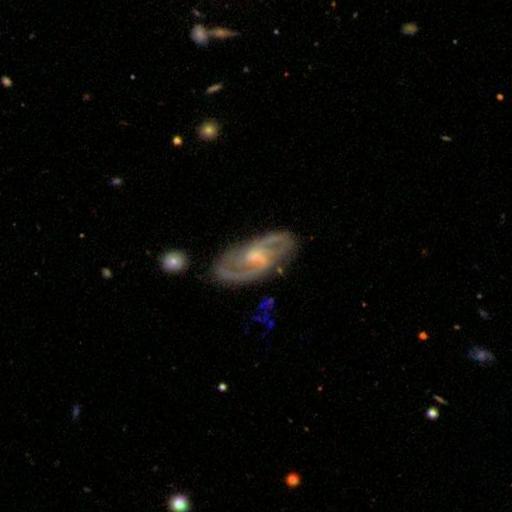 Hanny’s Voorwerp – now in HST!
Hanny’s Voorwerp – now in HST!
In the vein of astronomical objects discovered by amateurs, I’ve got to mention the newly released Hubble image of Hanny’s Voorwerp.
I’ll tell you the story, but first a couple important links:
- Galaxy Zoo (where the Voorwerp was discovered, and you can make discoveries of your own)
- Hanny’s Voorwerp in Hanny’s words
- The comic book (yes, there is now a comic book), Hanny and the Mystery of the Voorwerp
The Story
Once upon a time in 2007, Hanny von Arkel, a Dutch schoolteacher, logged into Galaxy Zoo to help scientists classify some galaxies. She hadn’t been at it very long when she found the picture at left.
She was not the first person asked to classify this galaxy, and not the first person to notice the blue tangled smudge. But she asked what it was – and no one knew the answer.
Another site user suggested calling it Voorwerp – “Object” in Dutch. And thus, Hanny’s Voorwerp was discovered.
In Short
Hanny’s Voorwerp is a light echo. There is a long streamer of gas in and beyond the area of the Voorwerp. When light from a nearby active galaxy hit the gas, it lit up. That’s what we’re seeing now, illuminated gasses.
Hubbly has discovered some new things in the Voorwerp. Notice the orange tip? That’s a collection of previously-unseen star clusters.
The dark “hole” in the Voorwerp is possibly just a shadow cast by something much closer to the galaxy, not a feature of the Voorwerp.
It is located in Leo Minor – R.A. 09h 41m 03s.80, Dec. +34° 43′ 34″.21
In Detail
Light Echoes –
Light echoes are awesome, and if you check back this evening, I should have a little animation.

Animated Explanation of a Light Echo - Distances/Sizes/Time NOT to scale, and this is an explanation of a light echo, not necessarily exactly the scenario for the Voorwerp. Animation by me.
Light, albeit the fastest traveler in the universe, takes a while to get between places. The light left the galaxy on its way to the Voorwerp, and while it was still in transit, the source “turned off.” That’s fine, and didn’t affect the light that was already in transit. As soon as that light reaches the Voorwerp it lights it up or excites the gas in the Voorwerp. So the Voorwerp starts emitting light too. A little later, on Earth (probably before people were observing the sky), the original light from the galaxy arrives, and we can see the galaxy (but not the Voorwerp). The light from the Voorwerp is still travelling towards up. At this point, there is no longer any light lighting up or exciting the Voorwerp, so it to goes dim. A bit later the light from the Voorwerp finally reaches Earth, long after we have observed the galaxy dimming to normal levels, leaving us with a picture of an illuminated Voorwerp, and no apparent source of illumination.
V838 Mon is another example of a light echo.
Want More?
![]()
~ A l i c e !







Thanks for the explanation; I didn’t realize that the Voorwerp was off to the side of the source of its light. What an interesting universe we live in!